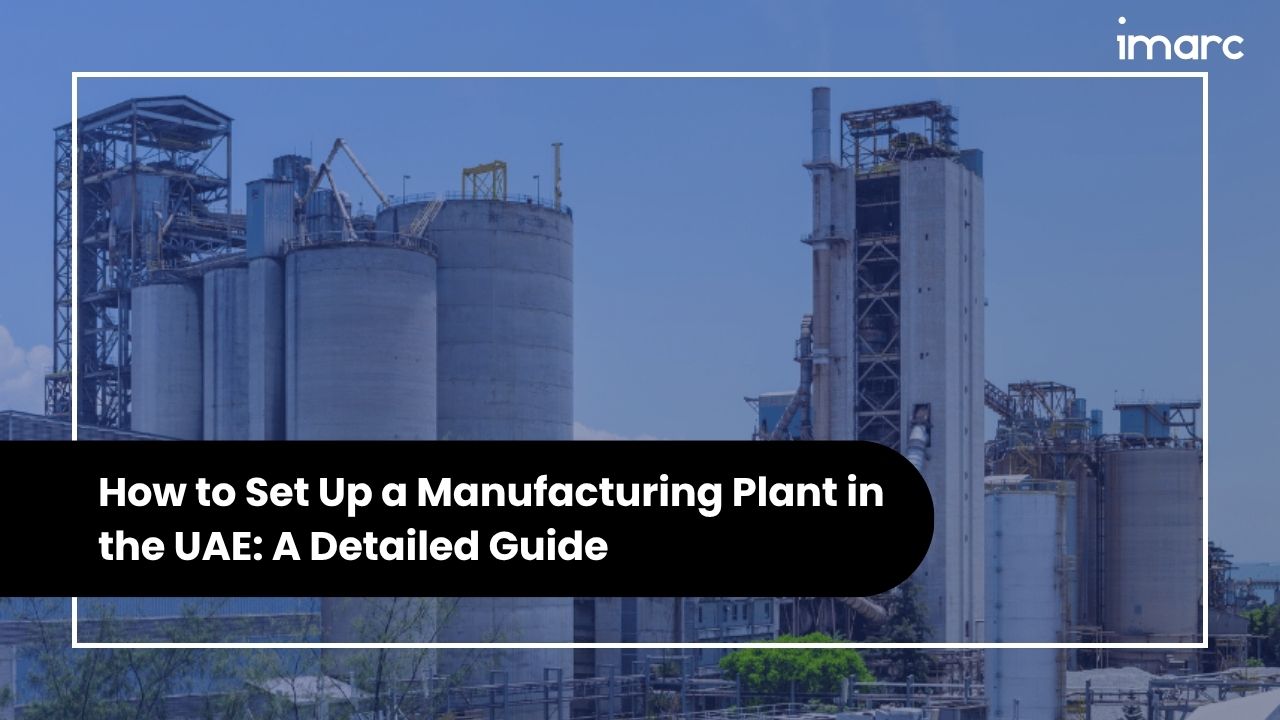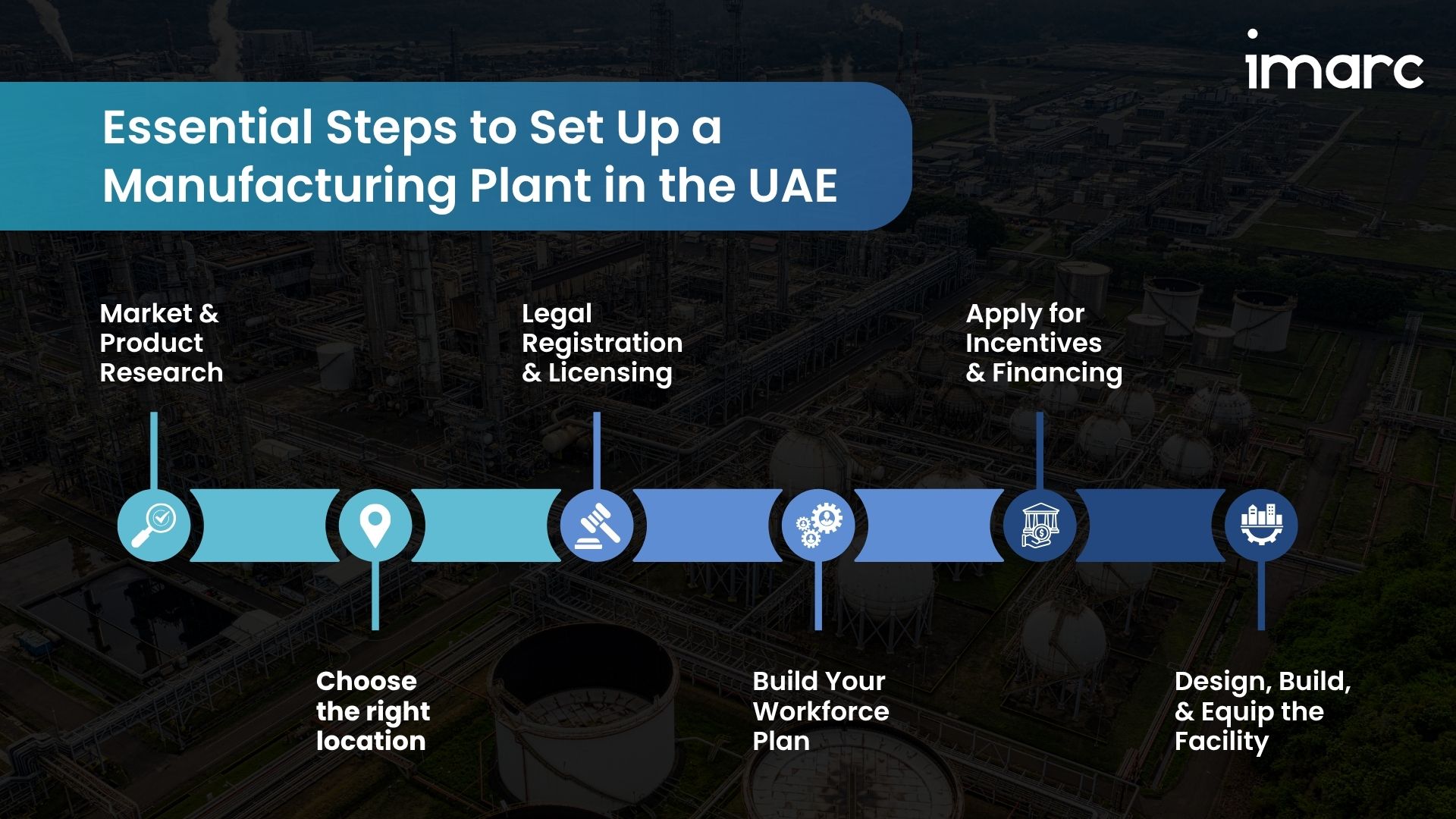How to Set Up a Manufacturing Plant in the UAE: A Detailed Guide

Opening a manufacturing facility in the United Arab Emirates is an opportunity to tap into one of the Gulf’s strongest, fastest-growing industrial markets. With modern infrastructure, investor-friendly free zones, and strong government backing, the UAE has become one of the Gulf’s leading destinations for advanced manufacturing. But moving from concept to reality requires careful steps: solid research, realistic timelines, clear legal compliance, and cost controls. Getting a plant off the ground here takes strategic planning, clear budgeting, and an understanding of how the UAE’s business landscape works.
Here’s a practical guide covering the major points from incentives and site selection to navigating common challenges:
Why the UAE Stands Out for Manufacturers
Fast-Rising Industrial Base
Since the launch of the “Operation 300bn” program in 2021, the UAE has made clear it wants to become the region’s leading advanced manufacturing hub. The plan aims to expand the industrial sector’s share of national GDP to AED 300 billion by 2031, encouraging growth in key sectors: clean energy, aerospace, petrochemicals, food processing, biotechnology, smart manufacturing, and semiconductors. The government backs this goal with incentives, banking support, new industrial clusters, and export tools for local producers.
Regional Trade Gateway
The UAE’s geography enables companies to quickly connect their supply chains. Dubai’s Jebel Ali Port is the largest container port in the Middle East, handling over 14 Million TEUs annually. Abu Dhabi’s Khalifa Port has become a busy regional gateway for containers and bulk cargo. Concurrent with this, in April 2025, Abu Dhabi intensified its efforts to establish itself as a regional trade gateway for manufacturing, with a focus on India and global markets. Backed by the Abu Dhabi Industrial Strategy, the emirate aims to double manufacturing output and expand non-oil GDP by 2031. The national rail network is expanding to link ports to inland industrial clusters, while world-class airports handle air freight across Europe, Asia, and Africa in under eight hours.
Business-Friendly Policies
The UAE offers full foreign ownership in most sectors through free zones, competitive tax structures, and easy repatriation of profits. Tariffs are low or zero for re-exports, and the country’s free zones offer 100% foreign ownership and profit repatriation. In March 2025, the UAE reinforced its business-friendly policies for manufacturing by confirming full foreign ownership for mainland industrial firms. Free zones continued to offer 100% profit repatriation and lower import-export duties, making the country more attractive for global manufacturers expanding their regional production. This makes the UAE a magnet for firms wanting a regional base without joint venture constraints.
Major Advantages of Setting Up a Plant in the UAE
1. Government Incentives and Support
The UAE federal and local governments support manufacturers through grants, tax holidays, and ready-built facilities:
- Operation 300bn: This national program backs industrial growth through financing, export support, and tech partnerships.
- Emirates Development Bank (EDB): Offers competitive loans for industrial projects.
- Free Zones: Free trade zones like Jebel Ali Free Zone (JAFZA), KIZAD, and Dubai Industrial City offer duty exemptions, custom-built industrial plots, and streamlined licensing.
- Energy and Utilities: Many zones offer discounted rates for heavy power or water usage, critical for sectors like food processing and chemical plants.
2. Modern Infrastructure and Logistics
Manufacturers benefit from excellent ports, highways, industrial parks, and reliable utilities. The UAE is investing heavily in sustainable energy and smart grids to power next-generation factories.
3. Diverse Workforce
The UAE’s labor market combines a skilled local base with millions of foreign workers. Vocational institutes like ADVETI and the Higher Colleges of Technology help train Emirati technicians. The government’s recent Industrialists Program aims to add thousands of UAE nationals to advanced manufacturing jobs, backed by federal funding and local incentives.
4. Legal Protections for IP and Contracts
The UAE has strengthened its IP regime to protect patents, trademarks, and industrial designs. Manufacturers dealing in proprietary technologies and sensitive designs benefit from the UAE’s improved IP regime. The government has strengthened patent registration and enforcement, making it easier to protect industrial designs, production know-how, and brand assets.
5. Strategic Domestic Demand and Export Reach
Manufacturers serving construction, aviation, and energy find a healthy domestic market. Companies also leverage the UAE’s trade agreements for wider regional exports, including to the GCC and Africa.
Major Leading Industries Driving UAE Manufacturing
The country’s industrial strategy focuses on future-ready sectors with high growth and government support:
- Petrochemicals and Refining: Abu Dhabi’s Ruwais complex is one of the world’s largest petrochemical hubs, with ADNOC leading expansions to process more downstream products locally.
- Aerospace: Strata and EDGE Group show the UAE’s commitment to becoming an aerospace components manufacturing hub, with deals supplying Boeing and Airbus.
- Renewables: Masdar City and Al Dhafra Solar show the UAE’s push for clean energy. Solar panel assembly, green hydrogen, and battery storage are emerging investment areas.
- Pharmaceuticals and Biotechnology: Julphar, Neopharma, and other local pharma firms produce generics and have expanded into vaccines and biologics, boosted by COVID-19 supply chain lessons.
- Food and Beverage Processing: With high food import dependence, local production of packaged foods, meat, dairy, and beverages is growing fast.
- Industrial Machinery and Smart Tech: The UAE aims to establish regional hub for Industry 4.0 solutions, with a strong emphasis on robotics, smart automation, and IoT-driven manufacturing.
How Long It Takes to Build a Plant
Realistic Timeline: From Groundbreaking to Production
The schedule depends on your industry, plant size, industry, location, and approvals:
- Standard Facilities (18–30 Months): General factories, like F&B or textiles.
- Fast-Track Modular (12–18 Months): Pre-fabricated units or brownfield upgrades.
- High-Tech or Heavy Industry (24–40 Months): Aerospace, petrochemicals, or large-scale processing lines.
Essential Steps to Set Up a Manufacturing Plant in the UAE

1. Market and Product Research
Study demand in the UAE and the wider GCC. Understand import/export trends, customs duties, and competition. Tap into data from Dubai Chamber of Commerce, UAE Ministry of Economy, and local trade bodies.
2. Choose the Right Location
Options include mainland industrial zones or free zones. Mainland lets you sell more freely within the UAE but may have Emirati partnership rules (though many restrictions have eased). Free zones offer full foreign ownership, customs benefits, and easier repatriation but may limit direct local sales.
Key factors to consider:
- Proximity to raw materials and suppliers
- Access to ports or airports
- Utility reliability and rates
- Zoning for environmental and safety standards
3. Legal Registration and Licensing
Register your business with the Department of Economic Development (DED) for mainland or with the relevant free zone authority. Get:
- Trade license
- Industrial license
- Environmental approvals from relevant municipalities
- Visa quotas for foreign workers
4. Build Your Workforce Plan
Source skilled staff locally or from abroad. Partner with training institutes like Abu Dhabi Vocational Education and Training Institute (ADVETI) or local polytechnics for technical hires. Keep up with Emiratization quotas for certain sectors.
5. Apply for Incentives and Financing
Work with the Ministry of Industry and Advanced Technology (MoIAT), free zone authorities, and EDB for financing, lease deals, and customs support.
6. Design, Build, and Equip the Facility
Design your plant layout, buy and install machinery, and connect to utilities. The UAE’s push for smart factories means more firms are adopting ERP, IoT sensors, and AI-based predictive maintenance.
Real-World Challenges to Plan For
- Complex Approvals: Different emirates have slightly different rules. Coordination between federal and local bodies can cause delays if paperwork is incomplete.
- High Setup Costs: Land leases, machinery imports, and fit-out expenses can escalate quickly. Companies should consider utilizing subsidized plots in free zones or government-supported industrial parks.
- Workforce Issues: It is a multicultural workforce — aligning training and safety standards across staff can be tricky. Labor law compliance and visa renewals need careful tracking.
- IP Enforcement: The UAE’s IP laws have improved, but firms must actively register and monitor rights. Work with trusted local legal counsel to handle infringement or counterfeiting issues.
How IMARC Supports UAE Manufacturing Expansion
IMARC helps clients tackle the complexity of setting up in the UAE with detailed research, clear feasibility studies, and practical support.
Market Research and Strategic Insights: Building a successful manufacturing plant in the UAE requires more than construction alone — it depends on clear knowledge of domestic demand, buyer behavior, import trends, and local competition. IMARC Group supports you with:
- In-depth market research to identify demand trends, target segments, and new growth areas in the UAE and wider GCC region.
- Strategic insights to help you position your products competitively and adapt to regional pricing dynamics.
- Advice on sourcing reliable local suppliers, logistics partners, and distribution networks.
Comprehensive Pre-Feasibility Studies: We understand every UAE manufacturing project faces its own challenges and local variables. Our pre-feasibility studies provide a detailed analysis of:
- Market feasibility, demand forecasts, and regional trade prospects.
- Full cost estimates covering land leases, facility design, machinery, fit-out, and staffing.
- Evaluation of free zone or mainland options based on logistics, access to ports, utilities, and workforce availability.
Guidance on Location Selection: The UAE has multiple industrial clusters and free zones, each with unique advantages. IMARC’s experts help you identify the best location for your plant by considering:
- Proximity to raw materials, suppliers, and target buyers.
- Connectivity to ports, airports, and major highways for smooth import and export.
- Availability of skilled labor and the most favorable leasing and utility costs.
Cost Estimation and Financial Analysis: Accurate cost planning is essential for long-term viability. IMARC delivers detailed breakdowns and models so you can make sound investment decisions, including:
- Land acquisition or lease costs and site development expenses.
- Machinery, production line installation, and technology integration costs.
- Labor, utilities, ongoing maintenance, and compliance expenses.
- Projections for working capital, break-even points, and funding opportunities through the Emirates Development Bank and local partners.
Regulatory Compliance and Licensing: Navigating the UAE’s licensing and regulatory landscape is key for a smooth launch. IMARC assists clients with:
- Understanding local and federal rules for industrial operations.
- Obtaining trade licenses, industrial permits, environmental clearances, and customs registrations.
- Ensuring ongoing compliance with labor laws, visa rules, Emiratization requirements, and safety standards to avoid costly delays.
Final Note
Setting up a manufacturing plant in the UAE positions your business within a high-growth region with world-class logistics and a supportive government. The rewards are big, but so are the details — from choosing the right free zone to securing the workforce you need. By planning carefully, managing your costs, and getting expert help, you can turn a UAE manufacturing expansion into a strong, sustainable success.
IMARC works with firms to manage every aspect, from feasibility checks to site selection, licensing, and scaling production. Ready to make your UAE manufacturing plan happen? Connect with us to get started.
Our Clients
Contact Us
Have a question or need assistance?
Please complete the form with your inquiry or reach out to us at
Phone Number
+91-120-433-0800+1-201-971-6302
+44-753-714-6104










